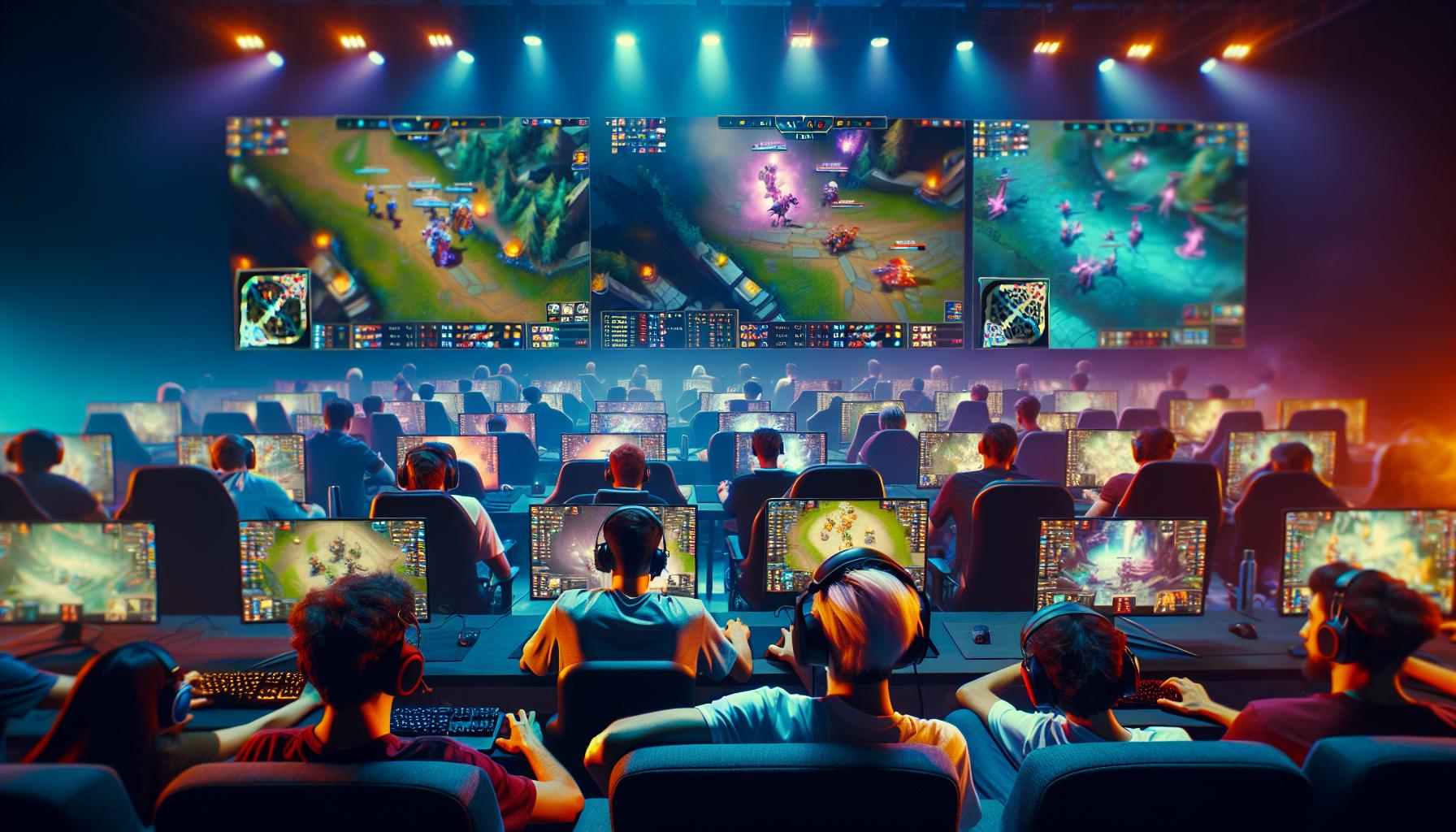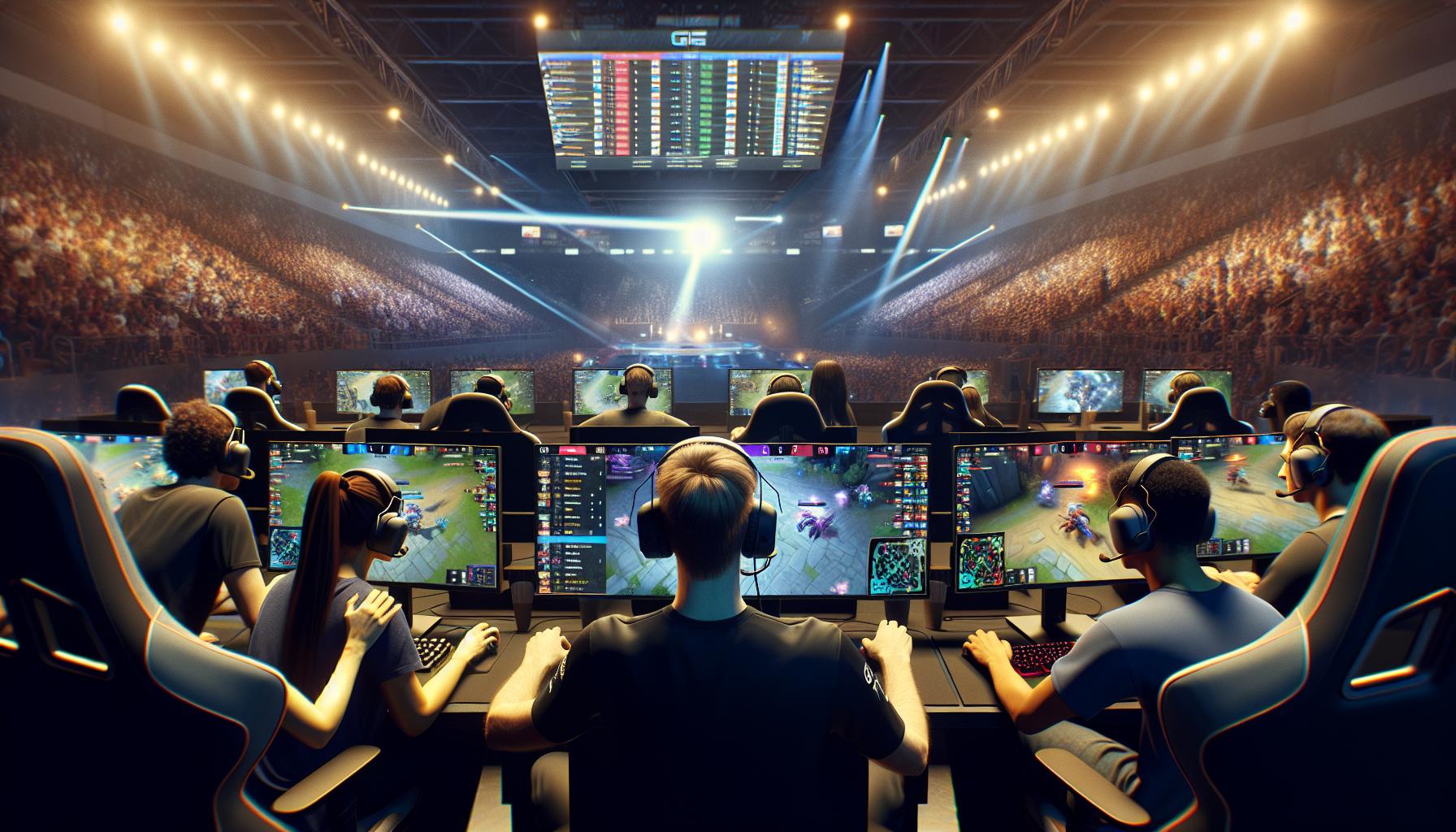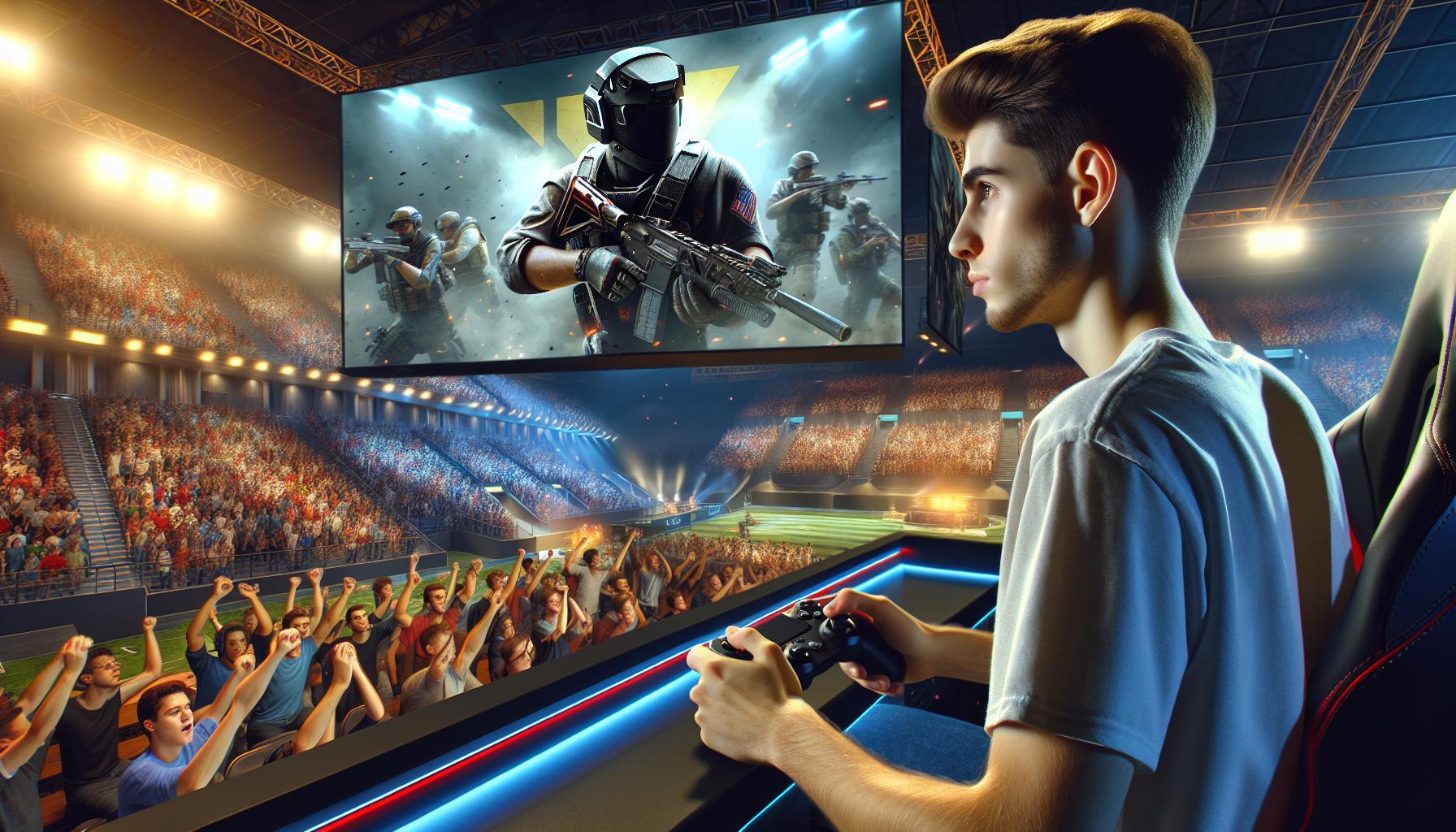Key Takeaways
- Evolution of Esports: Esports has transformed from a niche hobby to a global phenomenon, gaining traction since the 1970s with key tournaments and iconic games shaping its history and competitive landscape.
- Milestone Tournaments: Major tournaments like The International and the League of Legends World Championship have established significant prize pools and attracted millions of viewers, solidifying esports in mainstream entertainment.
- Influential Games: Landmark titles such as “StarCraft,” “Counter-Strike,” “League of Legends,” and “Dota 2” have played crucial roles in shaping the esports scene through innovative gameplay and strategic depth.
- Iconic Matches: Memorable matches, including the 2013 League of Legends World Championship Final and the 2018 The International Final, have captivated audiences and defined competitive gaming narratives.
- Legendary Players: Influential players like Faker, N0tail, and KuroKy have set new standards in esports with their remarkable skills and achievements, inspiring future generations of gamers.
- Cultural Impact: Esports has gained mainstream recognition, with partnerships from major brands and extensive media coverage, making it an integral part of contemporary culture and entertainment.
Esports has evolved from a niche hobby into a global phenomenon, captivating millions of fans and players alike. With thrilling competitions and unforgettable performances, the landscape of competitive gaming has produced some truly iconic moments that have shaped its history. From nail-biting comebacks to record-breaking tournaments, these events have defined what it means to be a champion in the digital arena.
As the industry continues to grow, the greatest moments in esports history serve as a testament to the passion and dedication of players and fans. They highlight the incredible skill and teamwork that go into each match, showcasing the emotional highs and lows that come with competitive play. Join in as we explore the milestones that have left an indelible mark on the world of esports, celebrating the unforgettable achievements that continue to inspire future generations.
Greatest Moments in Esports History
Esports history features numerous milestones that have defined its trajectory. These pivotal moments illustrate the growth and mainstream acceptance of competitive gaming.
The Rise of Competitive Gaming
Competitive gaming gained traction in the late 1970s, marked by early tournaments like the 1972 Space Invaders Championship, which attracted over 10,000 participants. The 1990s introduced iconic titles such as “Street Fighter II” and “Doom,” fostering local competitions and increasing player engagement. The launch of “StarCraft” in 1998 solidified the foundation of esports, especially in South Korea, where professional gaming took root. Breakthrough events, such as the World Cyber Games in 2000 and the Cyberathlete Professional League, further elevated the status of esports, attracting global players and viewers.
Evolution of Esports Tournaments
Esports tournaments have evolved significantly since their inception. The early 2000s witnessed the emergence of multi-title competitions. The Electronic Sports World Cup debuted in 2003, providing an international platform for talent. The introduction of live streaming in the 2010s transformed tournament accessibility, with platforms like Twitch enabling real-time spectator engagement. Major tournaments like The International, established in 2011 for “Dota 2,” showcased large prize pools, sometimes exceeding $34 million. Events such as the League of Legends World Championship now attract millions in viewership, solidifying esports as a key component of the entertainment landscape.
Memorable Game Releases and Updates

Significant game releases and updates have transformed the esports landscape, leaving unforgettable marks on the industry. These moments have shaped player experiences and influenced competitive dynamics.
Landmark Titles that Changed the Scene
- StarCraft (1998)
“StarCraft” revolutionized real-time strategy games, establishing a competitive scene in South Korea. The game’s balance and depth attracted professional players, elevating esports to new heights.
- Counter-Strike 1.6 (2000)
“Counter-Strike 1.6” became a staple in competitive gaming, creating a foundation for team-based shooters. Its tactical gameplay and team dynamics cultivated a dedicated community and professional leagues.
- League of Legends (2009)
“League of Legends” introduced the Multiplayer Online Battle Arena (MOBA) genre to the mainstream. Its strategic depth and team-oriented gameplay led to monumental growth in esports viewership and tournament prize pools.
- Dota 2 (2013)
“Dota 2,” with its innovative mechanics and free-to-play model, drew massive attention. Its annual championship, The International, set records for prize pools, solidifying its status in competitive gaming.
- Fortnite (2017)
“Fortnite” popularized battle royale games, attracting diverse audiences. Its large-scale events and inclusive design widened the esports landscape, making competitive gaming accessible to a broader range of players.
- Update 7.00 for Dota 2
This 2016 update revamped the entire gameplay structure, introducing new heroes, mechanics, and a new leveling system. It significantly shifted team strategies and altered competitive play.
- League of Legends Season Updates
Annual season updates in “League of Legends” introduce champion reworks, item changes, and gameplay adjustments. These updates continually refresh the meta, creating new strategies and enhancing competitive balance.
- Overwatch’s Role Queue
The introduction of role queue in “Overwatch” in 2019 streamlined matchmaking by assigning players specific roles. This change improved gameplay experience and increased team synergy in competitive matches.
- Counter-Strike: Global Offensive (CS:GO) Operations
Regular operations in “CS:GO” provide new maps, missions, and gameplay modes. These updates result in substantial shifts in the competitive meta, fueling player engagement.
- Fortnite’s Seasonal Changes
Seasonal updates in “Fortnite” alter the game environment significantly. New locations, weapons, and gameplay mechanics emerge, keeping the competitive landscape dynamic and unpredictable.
Iconic Matches that Defined Esports

Esports history features numerous iconic matches that captivated audiences and shaped competitive gaming. The following moments stand out for their intense gameplay and unforgettable narratives.
Epic Showdowns in Tournament History
Epic showdowns showcase the pinnacle of esports competition. Notable matches include:
- 2013 League of Legends World Championship Final: SK Telecom T1 faced Samsung White, drawing a peak viewership of over 32 million. The match highlighted advanced strategies and teamwork, setting new standards for future competitions.
- 2018 The International Final: OG versus PSG.LGD ended with a stunning 3-2 victory for OG. This match represented the first time a team secured The International title after starting in the lower bracket, enhancing its legacy within the Dota 2 community.
- 2015 ESL One Katowice CS:GO Final: Fnatic battled against Team Envy, delivering a thrilling display of skill. Fnatic’s comeback in front of a live audience solidified their status as a dominating force in Counter-Strike.
Underdogs Overcoming the Odds
Matches featuring underdogs overcoming the odds deliver inspiring moments in esports. Noteworthy instances include:
- 2016 Team Liquid at The International: Team Liquid entered the tournament as an underdog, eventually winning the championship after defeating Digital Chaos in an exhilarating final. Their unexpected victory resonated with fans and players alike, emphasizing resilience.
- 2017 Cloud9 at ELEAGUE Major: Cloud9, the first North American team to win a Major Counter-Strike event, achieved victory against FaZe Clan in a dramatic overtime match. Their triumph underscored the significance of perseverance in esports.
- 2020 G2 Esports’ Run at League of Legends World Championship: G2, considered an underdog, reached the finals against DWG KIA, showcasing incredible synergy and adaptability. Despite falling short, they left an indelible mark on the tournament’s narrative.
These iconic matches not only defined esports history but also inspired countless fans and players, demonstrating the thrill of competition in this fast-evolving landscape.
Influential Players and Teams

Esports history features numerous players and teams whose contributions significantly shaped the competitive landscape. Their achievements resonate within the community and inspire future talents.
Legendary Players Who Shaped the Scene
- Lee “Faker” Sang-hyeok – Known as one of the greatest “League of Legends” players, Faker led T1 (originally SK Telecom T1) to three World Championship titles (2013, 2015, 2016). His gameplay and strategic prowess set new standards for professional play.
- Johan “N0tail” Sundstein – As the captain of OG, N0tail led the team to victory in “Dota 2” at The International 2018 and 2019. His leadership and innovative strategies transformed team dynamics and established OG as a dominant force in the scene.
- Kuro “KuroKy” Salehi Takhasomi – KuroKy holds the record for the most International appearances and has played for multiple top teams. His versatility and tactical intelligence have made significant impacts on team strategies in “Dota 2.”
- Chris “Simp” Lehr – As a player for Atlanta FaZe, Simp gained recognition for his exceptional skill in “Call of Duty,” contributing to the team’s success in recent championships. His performances have set benchmarks for excellence in the competitive landscape.
- Dae-ho “Daeho” Jang – Known for his contributions to the fighting game community, Daeho excelled in “Street Fighter” tournaments, showcasing remarkable skills. His influence helped elevate the status of fighting games in esports.
- Team Liquid – A powerhouse in multiple esports titles, Team Liquid holds several championships, including victories in “Dota 2” and “Counter-Strike.” Their commitment to excellence and strategic gameplay has made them a respected organization in the esports community.
- Fnatic – Known for their achievements in “League of Legends” and “Counter-Strike,” Fnatic has garnered multiple championship titles, including the 2011 World Championship in “LoL.” Their consistent performance and brand loyalty resonate with fans worldwide.
- SK Telecom T1 – Renowned for their dominance in “League of Legends,” SKT has an illustrious history of championships, including three World Championships. Their innovative strategies and talented roster have set the bar for competitive teams.
- OG – The first team to win “Dota 2’s” The International twice, OG redefined competitive dynamics with their creative strategies and teamwork. Their legacy continues to inspire future generations of players.
- Dallas Fuel – In the Overwatch League, Dallas Fuel has made significant strides, showcasing skill and competitive spirit. Their achievements have contributed to the growth of the Overwatch esports scene.
Cultural Impact of Esports
Esports has grown from a niche activity into a cultural phenomenon, influencing various aspects of society. Its integration into popular culture demonstrates its significance beyond competitive gaming.
Esports and Mainstream Recognition
Esports gained mainstream recognition through strategic partnerships and media coverage. Major brands like Coca-Cola and Intel invested in esports, providing sponsorships that validate its status within the entertainment sector. National television networks started broadcasting tournaments, attracting audiences who may not typically engage with gaming. Events like the Overwatch League’s inaugural season showcased esports on platforms such as ESPN, drawing millions of viewers. These efforts highlight esports as a credible enterprise, paving the way for its acceptance in broader cultural discussions.
The Role of Social Media and Streaming
Social media platforms like Twitter, Facebook, and Instagram have amplified esports’ visibility, enabling real-time interaction among fans, players, and organizations. Highlights and clip-sharing enhance engagement and promote upcoming events. Streaming platforms, particularly Twitch and YouTube Gaming, revolutionized how audiences consume esports content. They provided instant access to live matches and encouraged community building through chat features. The rise of content creators and professional players on these platforms further nurtured fan loyalty, making esports an integral part of contemporary entertainment culture.
Esports Has Undeniably Carved Out Its Place in The Global Entertainment Landscape
Esports has undeniably carved out its place in the global entertainment landscape. The thrilling moments and groundbreaking events have not only shaped its history but also inspired countless fans and aspiring players. As the industry continues to evolve, the passion and dedication of the esports community will drive it forward.
With each milestone reached and every iconic match played, esports grows stronger and more influential. The future holds endless possibilities for innovation and engagement, ensuring that the greatest moments in esports history will continue to resonate for generations to come.